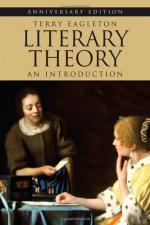
|
| Name: _________________________ | Period: ___________________ |
This quiz consists of 5 multiple choice and 5 short answer questions through Chapter 1, Rise of the English.
Multiple Choice Questions
1. Eagleton argues that the criteria for what counted as literature in the eighteenth-century was what?
(a) Ideological.
(b) Religious.
(c) Canonical.
(d) Practical.
2. Who silenced the Russian formalists, according to Eagleton?
(a) Stalinists.
(b) Socialists.
(c) Bolsheviks.
(d) Liberals.
3. According to Eagleton, the Russian formalist shifted their attention to the "material reality" of what?
(a) The text.
(b) The critic.
(c) The facts.
(d) The fiction.
4. According to Eagleton, "theory was a way of _______ literary works from the ________of civilised sensibility'"
(a) Excluding; oppression.
(b) Dismissing; idea.
(c) Emancipating; stranglehold.
(d) Studying; truth.
5. Eagleton provides the analogy of finding a "scrap of writing from a long-vanished civilization" to make what point about deciphering its meaning?
(a) That we would not know whether it was a piece of poetry or ordinary language.
(b) That we would be able to see that poetry didn't exist by looking at its language.
(c) That we would be able to learn that it was a piece of poetry by looking at the language.
(d) That we would be able to tell that it was a piece of poetry regardless of access to its language.
Short Answer Questions
1. Eagleton writes that "New Criticism was the ideology of an ________, _______intelligentsia who reinvented in literature what they could not locate in reality."
2. According to Eagleton, the sentence "this is awfully squiggly handwriting" from Knut Hamsun's "Hunger" tells him its literary because of what reason?
3. According to Eagleton, why did the Russian formalists NOT see a literary work as a vehicle for ideas, reflection of reality, or transcendental truth?
4. According to Eagleton, what becomes the "panacea for all problems" as part of the romantics' aesthetic theory at the turn of the eighteenth century?
5. Who is the key figure in the Victorian period Eagleton cites as "preternaturally aware of the needs of his social class"?
|
This section contains 355 words (approx. 2 pages at 300 words per page) |

|




